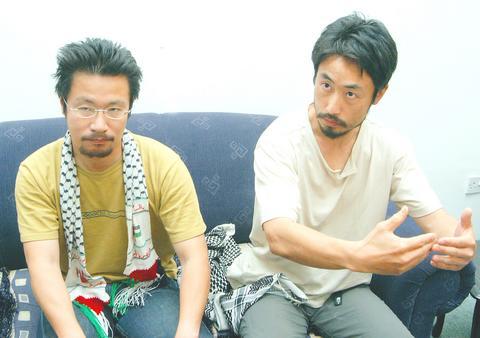Kidnappers freed two Japanese hostages in Baghdad yesterday, a day after a captured US soldier was paraded in a video tape aired on an Arab television channel.
A news cameraman saw freelance journalist Jumpei Yasuda, 30, and Nobutaka Watanabe, 36, a former member of the Japanese military with ties to a civic group, being handed to a Japanese delegation at the Um al-Qura mosque in apparent good health.
Insurgents have kidnapped more than 40 foreigners this month as US-led forces battle rebels in towns such as Fallujah in the Sunni Muslim heartlands of central Iraq and try to snuff out a revolt by a radical Shi'ite militia in the south.

PHOTO: REUTERS
The turmoil has prompted the US military to close highways north and south of Baghdad indefinitely yesterday, soon after US President George W. Bush and British Prime Minister Tony Blair vowed to stamp out violence in Iraq.
But guns fell silent in Falluja, west of Baghdad, where air strikes and clashes have frequently punctuated a shaky truce.
"For the first time in days, Fallujah is completely calm," said one resident in the battered city of 300,000.
Senior civilian and military representatives of Iraq's US-led administration had taken part in peace talks on Friday.
A senior official of Iraq's US-led administration said talks were to resume yesterday morning, though it was not immediately clear whether they had begun.
A senior US military official said a bridge to Fallujah's main hospital had been opened to traffic, but no overall deal had been reached with the estimated 1,000 to 2,000 fighters in the town. "Sitting on the fence is not an option," he declared.
The captors of US Private Keith Maupin, seized after an attack on a road convoy last week, released a videotape that showed him surrounded by masked gunmen.
Maupin, one of two missing US soldiers, identified himself in a soft voice on the videotape.
The two freed Japanese hostages said they had been well treated during their three days of captivity.
"We had a good meal every day," Yasuda said. "I don't know the place where we were. We were caught around Abu Ghraib [on the outskirts of Baghdad] and after that we were blindfolded and changed houses every day."
Most hostages have been released, including three other Japanese freed on Thursday.

A magnitude 7.0 earthquake struck off Yilan at 11:05pm yesterday, the Central Weather Administration (CWA) said. The epicenter was located at sea, about 32.3km east of Yilan County Hall, at a depth of 72.8km, CWA data showed There were no immediate reports of damage. The intensity of the quake, which gauges the actual effect of a seismic event, measured 4 in Yilan County area on Taiwan’s seven-tier intensity scale, the data showed. It measured 4 in other parts of eastern, northern and central Taiwan as well as Tainan, and 3 in Kaohsiung and Pingtung County, and 2 in Lienchiang and Penghu counties and 1

FOREIGN INTERFERENCE: Beijing would likely intensify public opinion warfare in next year’s local elections to prevent Lai from getting re-elected, the ‘Yomiuri Shimbun’ said Internal documents from a Chinese artificial intelligence (AI) company indicated that China has been using the technology to intervene in foreign elections, including propaganda targeting Taiwan’s local elections next year and presidential elections in 2028, a Japanese newspaper reported yesterday. The Institute of National Security of Vanderbilt University obtained nearly 400 pages of documents from GoLaxy, a company with ties to the Chinese government, and found evidence that it had apparently deployed sophisticated, AI-driven propaganda campaigns in Hong Kong and Taiwan to shape public opinion, the Yomiuri Shimbun reported. GoLaxy provides insights, situation analysis and public opinion-shaping technology by conducting network surveillance

‘POLITICAL GAME’: DPP lawmakers said the motion would not meet the legislative threshold needed, and accused the KMT and the TPP of trivializing the Constitution The Legislative Yuan yesterday approved a motion to initiate impeachment proceedings against President William Lai (賴清德), saying he had undermined Taiwan’s constitutional order and democracy. The motion was approved 61-50 by lawmakers from the main opposition Chinese Nationalist Party (KMT) and the smaller Taiwan People’s Party (TPP), who together hold a legislative majority. Under the motion, a roll call vote for impeachment would be held on May 19 next year, after various hearings are held and Lai is given the chance to defend himself. The move came after Lai on Monday last week did not promulgate an amendment passed by the legislature that

AFTERMATH: The Taipei City Government said it received 39 minor incident reports including gas leaks, water leaks and outages, and a damaged traffic signal A magnitude 7.0 earthquake struck off Taiwan’s northeastern coast late on Saturday, producing only two major aftershocks as of yesterday noon, the Central Weather Administration (CWA) said. The limited aftershocks contrast with last year’s major earthquake in Hualien County, as Saturday’s earthquake occurred at a greater depth in a subduction zone. Saturday’s earthquake struck at 11:05pm, with its hypocenter about 32.3km east of Yilan County Hall, at a depth of 72.8km. Shaking was felt in 17 administrative regions north of Tainan and in eastern Taiwan, reaching intensity level 4 on Taiwan’s seven-tier seismic scale, the CWA said. In Hualien, the